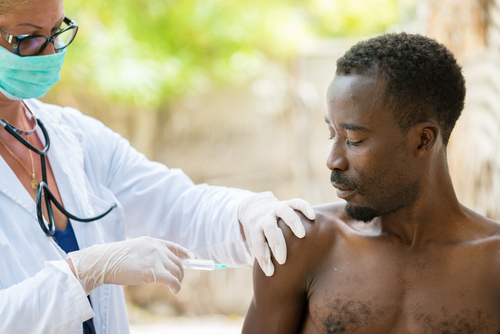
One of the most searing memories Thomas Frieden had during the 2014 West African Ebola outbreak was one in which he deeply questioned the international community’s effectiveness in supporting the health infrastructure of Ebola-plagued nations.
Then head of the Centers for Disease Control and Prevention, Frieden was visiting a remote area of Guinea where he met a local contact tracer, a person who identifies and records individuals exposed to symptomatic Ebola patients. When Frieden asked the man what more the world could offer to help him better do his job, the contract tracer replied that he couldn’t feed his family because he made $4 a day and hadn’t been paid in four months.
“It made me furious,” said Frieden, who is now president and CEO of Resolve to Save Lives, an initiative of Vital Strategies. “We have millions of meetings and workshops … and here’s this person who was actually on the front lines who hasn’t been paid.”
It was one of several examples cited by panelists last week during the Council on Foreign Relations meeting ‘The Fight Against Ebola’ in which they described how trust, or lack thereof, plays a fundamental role in ongoing Ebola outbreaks in West Africa.
Health experts worried about whether populations would accept, or trust, the science behind the Ebola vaccine. There hasn’t been widespread condemnation of the vaccine or the drugs to treat Ebola, the panelists said, however, other public health concerns highlight how fragile acceptance may ultimately be. This year alone in the Democratic Republic of Congo, there were nearly 400 attacks on health facilities fighting the ongoing Ebola epidemic, killing 11 people and injuring 83 healthcare workers and patients, according to the World Health Organization.
“You have to vaccinate people within a context—a political, economic, and security context,” said Michelle Gavin, senior fellow for Africa Studies, Council on Foreign Relations, and former U.S. ambassador to Botswana. “I think it’s important to step back and imagine the lived experience of people in eastern DRC.”
The region, where some of the most recent attacks on health workers have occurred, was also an opposition stronghold, as opponents rallied against outgoing President Joseph Kabila and the presidential candidate he endorsed as his successor. In response, government officials blamed Ebola for their decision to close polling stations in the area, claiming there was a risk of contracting the virus by touching voting machines. The WHO and the country’s own health officials had stated that precautions would make voting relatively safe. It’s estimated more than 1 million people were prevented from voting in the Congolese presidential election last year due to Ebola propaganda.
“The way that this is interpreted on the ground is that this is just one more tool for disenfranchisement. One more way the state will disregard our interests,” Gavin said. “When you consider the sort of totality of the context, you see how difficult it is for a population that’s been coping with these circumstances to have any kind of faith or trust in an internationally led response to any disease outbreak…it tells us that having a vaccine that works is insufficient to address these public health issues.”
Vaccines are only effective when other conditions are in place, the panelists agreed, and this is especially true of Ebola.
“It’s not like other vaccines where you vaccinate everybody and the disease can go away,” Frieden said. “In order to deploy this vaccine, you have to find the case, you have to isolate the patient, identify who the contacts are… you have to ensure the health workers are safe. If people die, you have to make sure they’re safely buried. All of those core fundamental public health functions continue whether or not we have a vaccine.”
One promising outlook regarding building trust is a vaccine administration that not only brings vaccines to a population, Frieden said, but also couples vaccine dissemination with a road project or a water sanitation initiative, demonstrating to the public that health workers are investing in the long-term wellbeing of the community.
Despite these efforts, one major hindrance in the fight against Ebola is tackling the stigma associated with the disease. Sometimes that stigma follows patients after they’ve been successfully treated. Misinformation and lack of information can result in survivors being threatened, attacked, evicted from their homes, and even expelled from their families. Rejection can also lead to death.
This was the case for Liberian nurse Salome Karwah, one of the health workers named as a Time magazine person of the year in 2014 for her work against the disease, said Jennifer Nuzzo, senior scholar, Center for Health Security, and associate professor at the Johns Hopkins Bloomberg School of Public Health. Karwah survived her own Ebola infection but years later died after childbirth from Caesarean complications. Nurses delayed treatment for fear Karwah still carried the Ebola virus, Nuzzo said.

